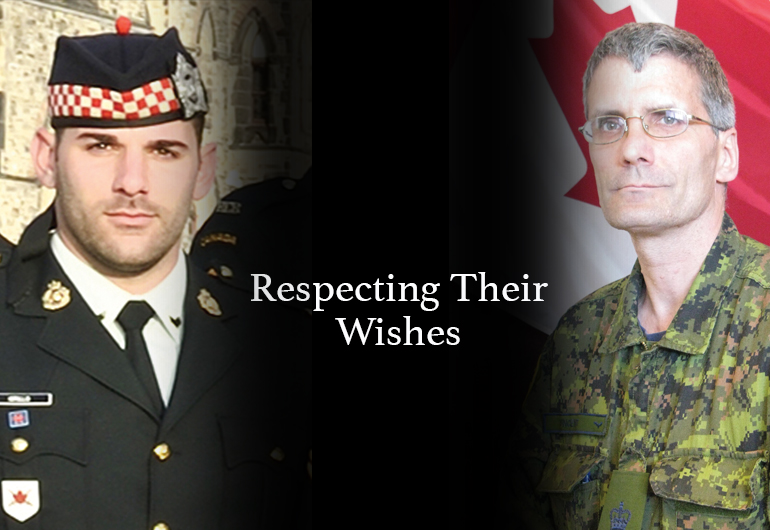The Family Unit
Respecting Their Wishes
In the aftermath of a catastrophe, when a military member dies or is injured in the line of duty, their family is assigned a designated assistant (DA) and a public affairs officer (PAO) to help in the days and weeks that follow.
Colonel Gerard Blais, Director Casualty Support Management of the CAF noted, “The Canadian Armed Forces recognizes the contributions and sacrifices made by our families. The personal and administrative support provided to families of fallen members, especially in times of crisis, is my priority.”
A DA is assigned to the next-of-kin (NOK) to serve as a vital link between the CAF and the family. The person selected is usually chosen from the member’s unit. This ensures they are familiar with the circumstances and are in close communication with the unit’s commanding officer.
“In the case of the recent deaths of Warrant Officer Patrice Vincent or Corporal Nathan Cirillo, as with any other deceased member the primary concern is for the wishes of the family. What do they need, counselling, assistance with funeral arrangements, transportation? Their DAs will do their best to address their wishes using the resources of the CAF,” explained Philip Ralph, regimental chaplain to the 32 Combat Engineer Regiment, and national program director Wounded Warriors Canada.
The DA helps the family from becoming overwhelmed by directing questions and concerns to the appropriate experts from the CAF. The DA remains available for a period of time, until the family is welcomed by the nearest Integrated Personnel Support Centre for ongoing care.
The family of a fallen soldier may be overwhelmed by media attention, adding to the stress of a difficult situation. The CAF provides their services of a Public Affairs Officer to help the family deal with the media attention. The PAO is a trained media professional who helps the family tell their story the way they want it to be told.
The PAO’s involvement is directed by the family’s wishes and they are often asked to create a buffer zone between the media and the family. The PAO also helps to answer public and media queries as well as facilitate the family’s communications needs. Media communications are handled in a way that allows the family room to grieve in privacy if they wish.
“The recent death of Corporal Cirrilo was very public. He was targeted at the most sacred monument of the CAF, and then the heart of our democracy, Parliament was threatened. The media ran with the story because of the circumstances. Warrant Officer Vincent was run down in a less conspicuous place. His family requested privacy and they were granted their request. Both men were supported by the CAF and the entire country and will be honoured as they ought to be,” said Ralph.
The role of the PAO is to communicate to the public and the media. However, a family may or may not want to provide statements.
“In all of the chaos of those two deaths there were heartwarming moments like when the media reported condolences from one family to another. That’s the wonderful thing about military families. Each family is grieving in different ways but they still supported each other through those statements,” said Ralph.
Families may prefer a church service or memorial service to remain private and the PAO can ensure this is communicated to the media. The attending PAO can also facilitate press conference or set up a designated area to be respected by the media. In all cases the wishes of the fallen family are the given top priority.
Corporal Cirello’s funeral was held earlier this week with Warrant Officer Vincent’s funeral being held this weekend.
By: Vicki L. Morrison










